Game Guides
Welcome to the ultimate source for gaming enthusiasts. Browse through endless amounts of game-related content that will help you achieve success in the games you play, may it be for fun or competitively.
Chess Masterclass: Learning from the Grandmasters
Chess, as a highly strategic and deeply intricate game, offers an opportunity to learn at every level. One of the best ways to improve your game and take it to the next level is by studying the masters of the craft - the grandmasters. Here are several ways to learn...
The Revolution of Chess: Engines, AI, and their Transformative Impact
The advent of computer technology has revolutionized numerous areas of human life, and the ancient game of chess is no exception. The rise of chess engines and AI (artificial intelligence) has brought a sea change in how we play, understand, and view this strategic...
The Power of Open Files and Diagonals in Chess
Chess is a game of strategy, tactics, and most importantly, control. Two key factors that significantly contribute to your control over the board are open files and diagonals. By fully understanding and exploiting these, you can take your chess skills to the next...
Mastering Chess Strategy: The Principle of Two Weaknesses
Chess endgames can often turn into battles between kings. The idea of "opposition" is one of the key concepts to understand when navigating through these situations. In this guide, we'll explore the various forms of opposition, understand why it's crucial, and how to...
Mastering Opposition in Chess Endgames
Chess endgames can often turn into battles between kings. The idea of "opposition" is one of the key concepts to understand when navigating through these situations. In this guide, we'll explore the various forms of opposition, understand why it's crucial, and how to...
Basic Chess Endgames: King and Queen
Endgames are crucial in the game of chess, and mastering them can significantly improve your overall chess skills. One of the basic and most common endgames is the King and Queen endgame. In this post, we'll discuss strategies, tactics, and common mistakes related to...
Basic Chess Endgames: King and Pawn vs King
Pawns, the humble foot soldiers of the chessboard, possess a unique strength when understood and utilized correctly. One intriguing configuration that often gets a bad rap is doubled pawns. In this comprehensive guide, we'll explore doubled pawns and how to leverage...
The Definitive Guide on Doubled Pawns
Pawns, the humble foot soldiers of the chessboard, possess a unique strength when understood and utilized correctly. One intriguing configuration that often gets a bad rap is doubled pawns. In this comprehensive guide, we'll explore doubled pawns and how to leverage...
Understanding Isolated Pawns and How to Exploit Them
In chess, the configuration of pawns is a crucial aspect that shapes the battle unfolding on the 64 squares. Among the many pawn structures that you may encounter, one of the most common and interesting is the isolated pawn. In this article, we delve into what an...
Importance of Space Advantage in Chess
In the intricate battle of chess, every square can make a difference. One of the most fundamental concepts in the game is the idea of space and the advantages that come with controlling it. In this post, we'll explore what space advantage is, why it's important, and...
How to Improve Your Tactical Vision in Chess
Improving your tactical vision in chess is key to advancing your game to the next level. Tactics are the short-term plans that you make to gain an advantage over your opponent, often involving threats, traps, and attacks. Having a keen tactical vision allows you to...
Introduction to Chess Patterns and Motifs
Understanding chess patterns and motifs is a crucial step on the road to improving your chess game. These recurring tactical or positional elements can guide your strategy, alert you to potential threats, and give you a leg up on less experienced opponents. Let's dive...
Essential Chess Endgame Concepts for Beginners
Learning to navigate the endgame is a vital part of developing your chess skills. This stage of the game, where only a few pieces are left on the board, can often be the deciding factor in whether you win or lose. So let's delve into some essential endgame concepts...
The Art of Sacrifice in Chess
Chess, as we all know, is a game filled with deep strategy and intricate tactics. A significant aspect of this captivating game involves the intentional loss of one's own pieces. This intriguing concept is known as 'sacrifice.' Today, let's delve deeper into this...
What is Zugzwang and How to Use It to Your Advantage
Chess, an elegant game of strategy and wit, is as much about the moves you make as it is about the ones you're compelled to make. Today, we're delving into the intriguing concept of Zugzwang—a unique scenario that highlights the compelling depth of chess. What Does...
The Role of Pawn Structures in Chess
If chess is a kingdom, then pawns are the architectural framework that holds it together. Although they may seem weak, they play a vital role in shaping the chessboard's landscape and determining the flow of the game. Let's delve deeper into understanding pawn...
How to Checkmate Your Opponent: Basic Techniques
Checkmate – the ultimate goal in chess. When your opponent's king is in a position to be captured ("check") and there is no way to move the king out of capture threat on the next move, this situation is "checkmate." Here are several essential techniques you can use to...
Effective Ways to Get Out of Check in Chess
Chess is a game of tactics and strategy. One of the critical situations you need to master handling is when your king is in "check". This post will break down various strategies you can utilize to protect your king and get out of check. Understanding Check: The Threat...
Understanding Chess Terms: Check, Checkmate, and Stalemate
In the world of chess, understanding the basic terminology is crucial for beginners to effectively learn and communicate about the game. Three terms that are absolutely essential to grasp are "Check," "Checkmate," and "Stalemate." This article will break down these...
Pawn Promotions in Chess and Its Strategic Implications
In the intricate game of chess, the seemingly small pawns hold within them the possibility of tremendous transformation. This potential is most explicitly embodied in the concept of "pawn promotion." Pawn promotion is a rule in chess that allows a pawn that reaches...
The Power of Castling: A Key Defensive Maneuver
Chess is a game of strategy and foresight. Among the various moves and rules that govern the game, there is a special move known as "castling." Castling can often be a powerful defensive maneuver that provides safety to your king and activates your rook. This post...
Understanding and Utilizing En Passant
In chess, there are a handful of moves and tactics that can surprise new players. One such move is known as "En Passant," which is French for "in passing." This unique move allows a pawn to capture an opponent's pawn in a way that breaks the typical rules of movement....
Basic Tactics: Introduction to Pins, Forks, and Skewers
In chess, the art of winning often lies in tactics. These are clever maneuvers that you use to put your opponent in a tough spot or to gain material advantage. Among the most basic and powerful tactics in chess are pins, forks, and skewers. These tactics can turn the...
Basics of Chess Strategy: Opening, Middlegame, and Endgame
Chess is a game of strategy. Whether you're a beginner or an experienced player, understanding the different phases of a chess game – the opening, middlegame, and endgame – can help you make more informed decisions and improve your performance. This article will...
Material Balance in Chess: When to Exchange Pieces
Chess is often a delicate balancing act, requiring the assessment and management of multiple variables simultaneously. One of the most critical elements to manage is your material on the board. Knowing when to exchange pieces can be the difference between a win or a...
The Concept of Initiative in Chess
Understanding the concept of initiative in chess is a pivotal step to improving your game. The initiative can dictate the pace and direction of the game, making it a powerful tool in the hands of the player who can wield it effectively. This blog post will explain...
Key Principles of Development in Chess
For beginners learning chess, understanding the key principles of development can elevate your game from a series of reactive moves to a strategic play. Development is the term used to describe the process of deploying your pieces from their initial positions to more...
How to Dominate the Centre in a Game of Chess (and Why It’s Important)
Chess is a game of strategy, and one of the most important concepts in this game is the control of the centre. This post will break down what this means, why it's important, and how you can apply it to your own games. What is the Centre in Chess? The centre in chess...
The 25 Best Chess Openings For Beginners
The opening of a chess game is a critical phase. It sets the tone for the rest of the game, and a good opening can give you a significant advantage. This post will explore 25 of the best chess openings for beginners, explaining what they are and why they are...
Understanding Chess Notation: Algebraic, Descriptive, and Computer
Chess is a complex game that requires strategizing, critical thinking, and sometimes, note-taking. One of the most vital aspects of learning and advancing in chess is understanding chess notation. Chess notation is a way to record games, analyze moves, and share your...
Setting Up the Chess Board: The Proper Layout
Before the strategic battles of chess can begin, you need to set up the battlefield. While setting up a chessboard might seem straightforward, getting the orientation and the arrangement of the pieces right is crucial. This guide will help you place each piece...
The Value of Chess Pieces: How much points are they worth?
In chess, understanding the relative value of each piece is vital to planning strategy and making sound decisions. The value of each chess piece is generally assigned based on their movement capabilities and role in the game. Let's delve into the subject. What are...
The Pawn Chess Piece – Starting Position, Movements, Values, and Role
Among all the chess pieces, the pawn may seem like the least powerful. However, the humble pawn plays a crucial role in the game of chess, from controlling the center of the board to becoming a queen. In this post, we will explore the characteristics, movements,...
The Knight Chess Piece – Starting Position, Movements, Values, and Role
Stepping into the world of chess, you'll find each piece carries unique movements and strategies, contributing to the richness of the game. Among them, the Knight stands out for its distinctive move and tactical prowess. Today, we'll discuss the Knight's...
The Bishop Chess Piece – Starting Position, Movements, Values, and Role
The Bishop, with its diagonal movements, adds a dynamic layer to the game of chess. Each player begins the game with two Bishops, and knowing how to use them effectively can greatly enhance your strategy. In this blog post, we'll delve into everything about the...
The Castle Chess Piece – Starting Position, Movements, Values, and Role
In the landscape of a chessboard, the Castle, also known as the Rook, is one of the most strategically vital pieces. It stands tall on the corners of the board, ready to sweep across ranks and files when the time is right. In this blog post, we'll explore the Castle...
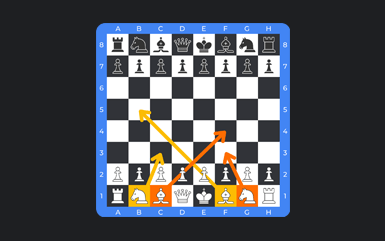
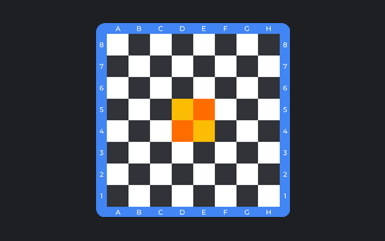
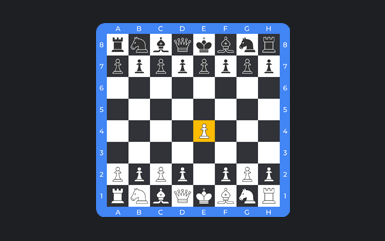
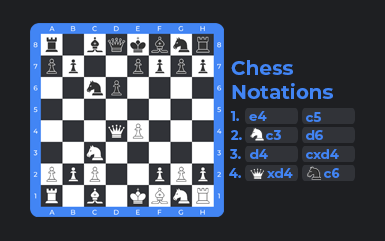
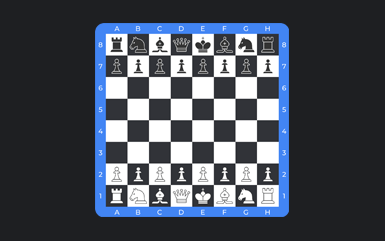
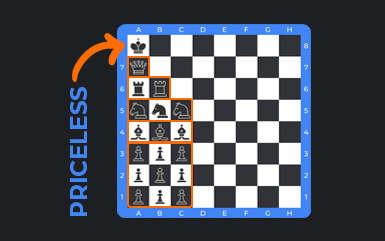
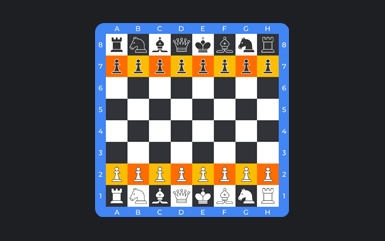
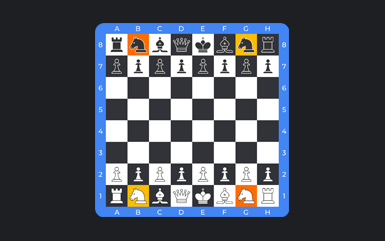
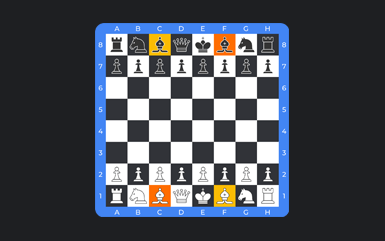
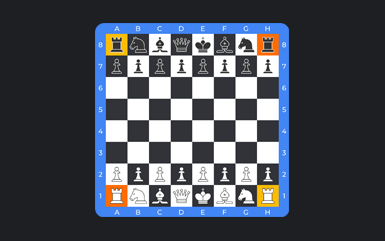
 Protected by Patchstack
Protected by Patchstack